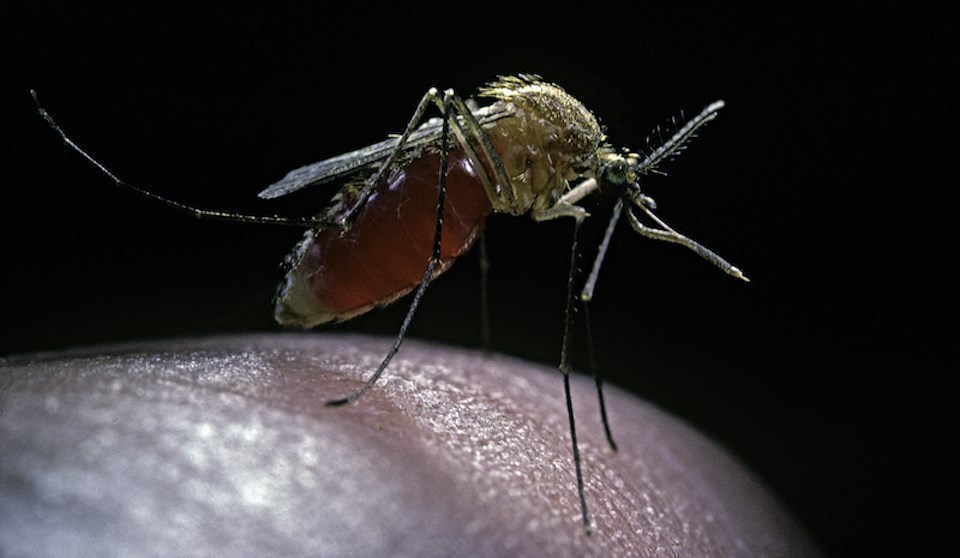Will Metro Vancouver have a bloodsucker boom at any point this year?
Mosquitoes are an unavoidable nuisance in most parts of the world and the Lower Mainland is no exception. But when they hatch in a mass emergence, the pests can feel overwhelming.
Carl Lowenberger, a professor emeritus of entomology and parasitology at Simon Fraser University (SFU), says it's too early to know if one of these major hatching events will occur.
While several mosquito species buzz around the Lower Mainland, not all have the same egg-laying preferences.
Mosquitoes from the culex genus, also known as typical mosquitoes, are considered "year-round" mosquitoes.
A few culex mosquitoes "are already flying around" searching for a blood meal after hiding through the winter in attics or other warm places. These females would have emerged from the water during the fall, mated with males, and then went into hiding when they sensed the days were getting cooler and shorter, Lowenberger told V.I.A.
Once the temperature gets mild enough, it triggers the petite insects to leave their indoor locations in search of a blood meal. Once they get it, they will lay their eggs about a week later.
Mosquitoes will lay their eggs in several places, but most prefer areas with standing water. This could mean anything from a bird bath to a pond to even a puddle.
The mosquitoes will hatch into larvae — a wriggling worm-like stage of their development that emerges from the water to breathe — before it changes into its final form before adulthood (pupae).
Since the water in most places is around 10 C, the lifecycle moves dramatically slower. In the summer, when temperatures rise to 25 C and up, the lifecycle speeds up and repeats much faster.
Depending on the species, most adult mosquitoes increase their activity in the 20 C range and up. They can survive in a four-degree fridge — but they won't be buzzing around it. The Metro Vancouver weather forecast includes hotter-than-average temperatures this year.
But these culex mosquitoes aren't responsible for what's considered a "boom" in population growth.
Aedes mosquitoes are responsible for population 'boom'
Mosquitoes from the genus Aedes lay their eggs at the top of depressions, such as banks normally filled with snow or on the banks of rivers. If there is substantial rainfall or a major melt from a snowpack, the eggs will hatch when the water reaches the line where the eggs were laid.
When asked if the province's depleted snowpack reserves mean there won't be a noticeable mosquito "boom" this spring, Lowenberger said it is too early to tell.
"We don't know. If we get rain, and the rain allows the rivers to overflow the banks, it could still happen," he explained.
"But we need moisture."
Lowenberger notes the snowpack will melt in about another month, providing a better indication of how high the water will rise and if it will cover the eggs in the depressions.
"If they get the trigger, along the Fraser River, they hatch."
If there is another drought like the one in 2023 there will be fewer areas for females to lay their eggs.
"The quantity and timing of the rain are important," he added.
How can I help control mosquito populations and protect myself?
You can help control mosquito populations by preventing them from breeding or preventing the larvae from developing into adults. You do this by:
- removing standing water which provides breeding sites; and,
- controlling the larvae with an approved product.
You can also take the following steps to protect yourself:
- use a fly swatter to kill mosquitoes in the home;
- use an approved mosquito repellent with a PCP registration number on the label;
- wear loose clothes made of tightly woven materials that keep mosquitoes away from your skin, such as nylon or polyester;
- use mosquito netting when sleeping outdoors or in an unscreened structure (also use netting to protect infants when outdoors);
- wear long pants and sleeves as well as shoes and socks (you should do this if you're going to be outside when mosquitoes are most active); and,
- fix or replace old and torn screens in doors, windows and vents (inspect all other possible access points into your home and fix as needed).



